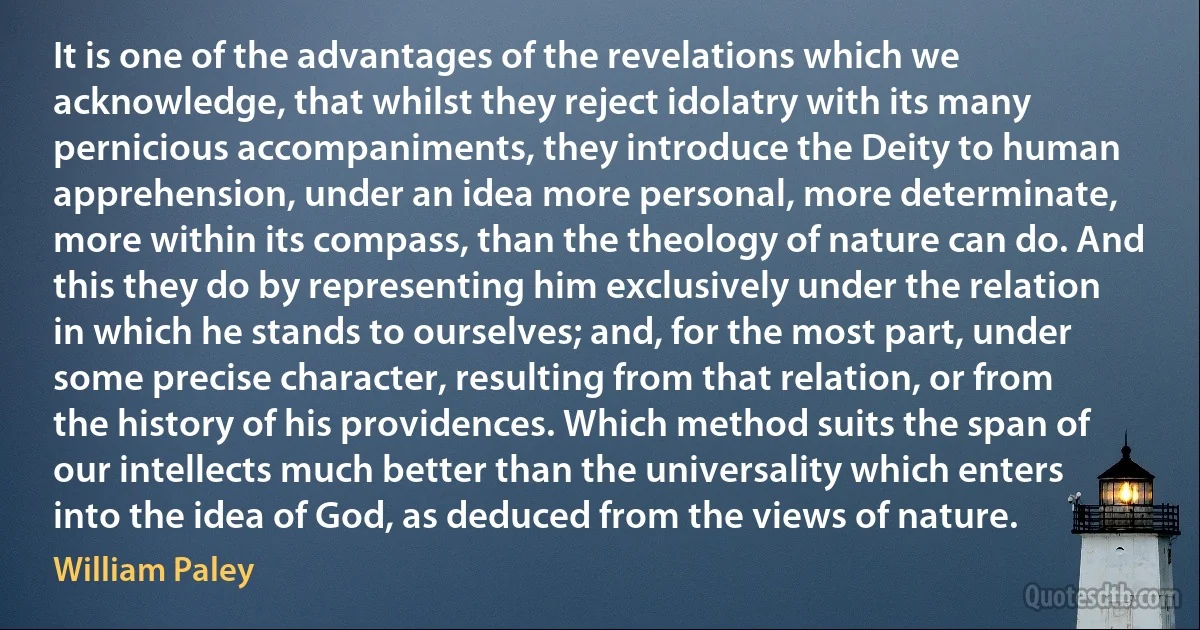William Paley quotes
Virtue is infinitely various. There is no situation in which a rational being is placed, from that of the best instructed Christian down to the condition of the rudest barbarian, which affords not room for moral agency; for the acquisition, exercise, and display of voluntary qualities, good and bad. Health and sickness, enjoyment and suffering, riches and poverty, knowledge and ignorance, power and subjection, liberty and bondage, civilisation and barbarity, have all their offices and duties, all serve for the formation of character: for when we speak of a state of trial, it must be remembered, that characters are not only tried, or proved, or detected, but that they are generated also, and formed, by circumstances. The best dispositions may subsist under the most depressed, the most afflicted fortunes.

William Paley
In every nature, and in every portion of nature, which we can descry, we find attention bestowed upon even the minutest parts. The hinges in the wings of an earwig, and the joints of its antennae, are as highly wrought, as if the Creator had nothing else to finish. We see no signs of dimunition of care by multiplicity of objects, or of distraction of thought by variety. We have no reason to fear, therefore, our being forgotten, or overlooked, or neglected.

William Paley
One question may possibly have dwelt in the reader's mind during the perusal of these observations, namely, Why should not the Deity have given to the animal the faculty of vision at once? ... Why resort to contrivance, where power is omnipotent? Contrivance, by its very definition and nature, is the refuge of imperfection. To have recourse to expedients, implies difficulty, impediment, restraint, defect of power. ... amongst other answers which may be given to it; beside reasons of which probably we are ignorant, one answer is this: It is only by the display of contrivance, that the existence, the agency, the wisdom of the Deity, could be testified to his rational creatures.

William Paley
The contrivances of nature surpass the contrivances of art, in the complexity, subtlety, and curiosity of the mechanism; and still more, if possible, do they go beyond them in number and variety; yet in a multitude of cases, are not less evidently mechanical, not less evidently contrivances, not less evidently accommodated to their end, or suited to their office than are the most perfect production of human ingenuity.

William Paley
In all cases, wherein the mind feels itself in danger of being confounded by variety, it is sure to rest upon a few strong points, or perhaps upon a single instance. Amongst a multitude of proofs, it is one that does the business. If we observe in any argument, that hardly two minds fix upon the same instance, the diversity of choice shows the strength of the argument, because it shows the number and competition of the examples. There is no subject in which the tendency to dwell upon select or single topics is so usual, because there is no subject, of which, in its full extent, the latitude is so great, as that of natural history applied to the proof of an intelligent Creator.

William Paley
[E]lections to the supreme power having upon some occasions produced the most destructive contentions, many states would take refuge from a return of the same calamities, in a rule of succession; and no rule presents itself so obvious, certain, and intelligible, as consanguinity of birth.

William Paley
Government, at first, was either patriarchal or military; that of a parent over his family, or of a commander over his fellow warriors. ... Paternal authority, and the order of domestic life, supplied the foundation of civil government. ... A family contains the rudiments of an empire. The authority of one over many, and the disposition to govern and be governed, are in this way incidental to the very nature, and coeval, no doubt, with the existence of the human species.

William Paley


